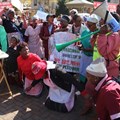UIF registration system works poorly.

Four years after the landmark Concourt Mahalangu ruling, domestic workers are still unable to access compensation. Archive photo: Bernard Chiguvare / GroundUp
Employers are evading accountability when domestic workers are injured on the job, Pinky Mashiane, founder of United Domestic Workers of South Africa (Udwosa), told a roundtable discussion organised by the Social Economic Rights Institute at the Nelson Mandela Foundation in Johannesburg on Thursday.
The discussion comes on the fourth anniversary of the landmark Constitutional Court Mahlangu ruling in 2020 that gave domestic workers the right to be covered by the Compensation for Occupational Injuries and Diseases Act (Coida).
Following the ruling, the Department of Labour made amendments to allow for the inclusion of domestic workers and called on employers to register their employees and contribute to the fund. It also embarked on a nationwide awareness campaign.
But Mashiane says many employers have still not registered their workers for compensation or with the Unemployment Insurance Fund or even implemented the national minimum wage.
She said few of Udwosa’s 820 members are registered for both Coida and UIF.
Some domestic workers are afraid they will lose their jobs if they demand registration.
Mashiane said the Department of Labour needs to take action.
Kimberly Mutandiro 8 Aug 2023
Hannah Kaisa said none of her three employers since 2015 registered her for UIF. She was unable to claim any benefits when her employment was twice abruptly terminated.
“The Department of Labour should make inspections in private residential areas where we work and compel our employers to register us,” she said.
“All we want is for our rights to be recognised,” said Talent Ncube. She was unfairly dismissed two months ago and she is struggling because she has no UIF.
Chiedza Maphosa, a domestic worker with a Zimbabwe Exception Permit, lost her job in 2023 and has been struggling to access her UIF money for the past year.
“There have been issues with the department officials failing to understand the validity of my permit. At first, they asked me to bring a valid permit. When I told them that the permit was extended, they told me that they needed to do some verification first. To date, I’m still waiting,” she said.
Maggie Mthombeni, from Izwi Domestic Workers, which represents mostly immigrant workers, said they had cases where UIF deductions were made only to discover later the workers were never registered.
Deputy director from the Compensation Fund Sifiso Dlamini said the department had only received 43 claims, of which 40 were for occupational injury.
UIF registration system makes it hard
In 2020, GroundUp published a story explaining how one of its staff members attempted to register a domestic worker on the UIF system. The attempt ended in failure because of a myriad system problems including difficulty resetting a password.
On Friday, a GroundUp staff member tried to register a domestic worker on UIF. Again the system presented barriers. The staff member discovered that he was still registered on the UIF system. He asked for a password reset, but no password reset email arrived (he checked his spam folder).
While some employers may not be registering their domestic workers out of choice, many who wish to comply with the law have likely been frustrated by a poorly implemented computer system.
This article was originally published on GroundUp.
© 2024 GroundUp. This article is licensed under a Creative Commons Attribution-NoDerivatives 4.0 International License.
































